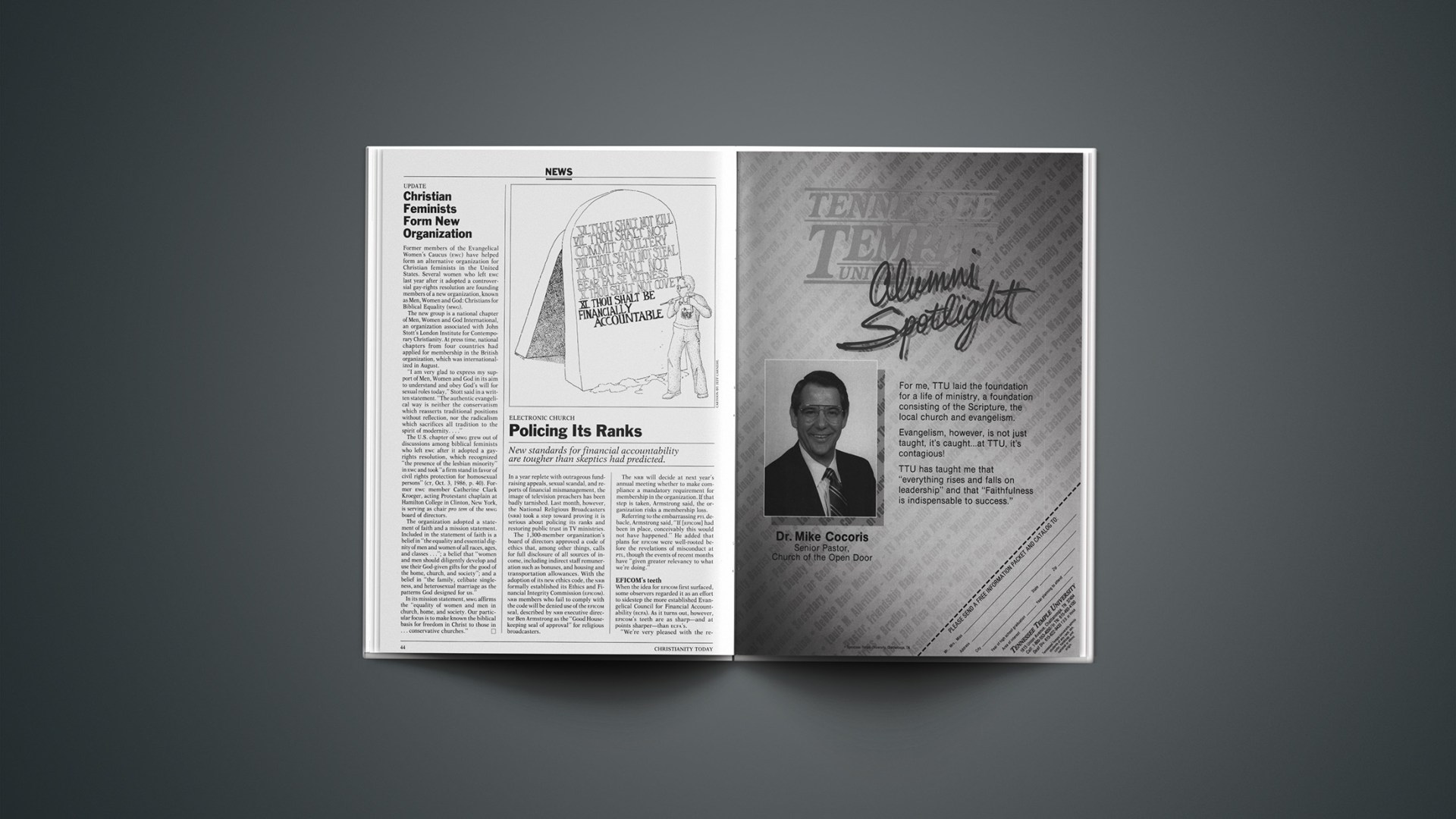In a year replete with outrageous fund-raising appeals, sexual scandal, and reports of financial mismanagement, the image of television preachers has been badly tarnished. Last month, however, the National Religious Broadcasters (NRB) took a step toward proving it is serious about policing its ranks and restoring public trust in TV ministries.
The 1,300-member organization’s board of directors approved a code of ethics that, among other things, calls for full disclosure of all sources of income, including indirect staff remuneration such as bonuses, and housing and transportation allowances. With the adoption of its new ethics code, the NRB formally established its Ethics and Financial Integrity Commission (EFICOM). NRB members who fail to comply with the code will be denied use of the EFICOM seal, described by NRB executive director Ben Armstrong as the “Good Housekeeping seal of approval” for religious broadcasters.
The NRB will decide at next year’s annual meeting whether to make compliance a mandatory requirement for membership in the organization. If that step is taken, Armstrong said, the organization risks a membership loss.
Referring to the embarrassing PTL debacle, Armstrong said, “If [EFICOM] had been in place, conceivably this would not have happened.” He added that plans for EFICOM were well-rooted before the revelations of misconduct at PTL, though the events of recent months have “given greater relevancy to what we’re doing.”
Eficom’s Teeth
When the idea for EFICOM first surfaced, some observers regarded it as an effort to sidestep the more established Evangelical Council for Financial Accountability (ECFA). AS it turns out, however, EFICOM’S teeth are as sharp—and at points sharper—than ECFA’S.
“We’re very pleased with the results,” said Arthur Borden, president of ECFA, who met regularly with EFICOM as the new code was being developed. “The standards were stronger with each new draft.” The two organizations have discussed a cooperative relationship in administering the EFICOM code, but the specifics have yet to be determined.
Like ECFA, EFICOM mandates annual audits and reviews of fund-raising materials. It also prohibits a broadcaster’s family members from making up more than 50 percent of his organization’s governing board.
EFICOM requires the disclosure of salaries and “perks,” which goes beyond current ECFA standards. Also, if a ministry loses its certification, EFICOM will publicly disclose the reasons. ECFA’S present policy is limited to responding to requests for information about decertified members.
(Several top religious broadcasters responded to a CHRISTIANITY TODAY survey on financial accountability. See adjacent sidebar and chart on pp. 48–49.)
Following Suit
ECFA’S Borden said EFICOM’S standards are stricter only because of the timing of the organization’s board meetings. He said the ECFA board, which meets this month, will likely adopt financial disclosure policies similar, if not identical, to EFTCOM’S. Borden will also propose to his board that ECFA begin monitoring nonmember organizations so it can better respond to donor inquiries.
The last several months, according to Borden, have witnessed a virtual revolution in the way Christians think about financial accountability. As for ECFA, he said, “Our posture is changing beneath our feet. There are things we might have let go a year ago that we would not let go now.”
More than 60 new organizations have joined ECFA so far in 1987, compared to a usual increase of about 30. The television ministries of D. James Kennedy, Richard DeHaan, and Fred Price are among the newcomers. ECFA’S membership of 405 now represents financial resources totaling $1.75 billion.
However, critics have raised the issue of how much membership in ECFA means. They point out that PTL was a member from 1981 until the end of 1986, a period during which many of its financial irregularies took place. Borden said ECFA recently enlisted an independent specialist on tax-exempt organizations to examine the statements submitted by PTL for the years it was a member. He said the examiner found nothing to suggest the problems that later came to light.
Borden said simply that the “information we received [from PTL] was not accurate.” He said the travesty has led to some fine tuning of ECFA policies and procedures, adding that “any of our members can deceive us if they want to, but only for a while.”
Regarding Oral Roberts’s controversial fund-raising appeal early this year, Borden said he doubted Roberts could survive long in ECFA with such tactics. The Tulsa evangelist told supporters God would “call him home” if he was unable to raise money needed for a medical missions program. If Roberts were a member of ECFA, Borden said, he would be told that such an appeal is not “within the spirit of the council.”
By Randy Frame.










